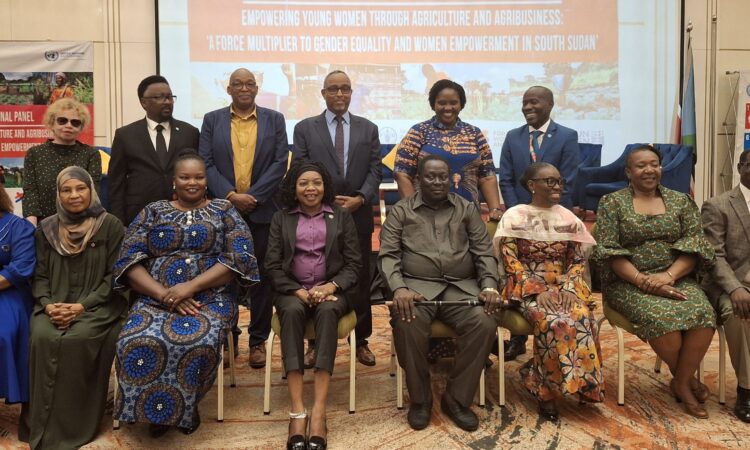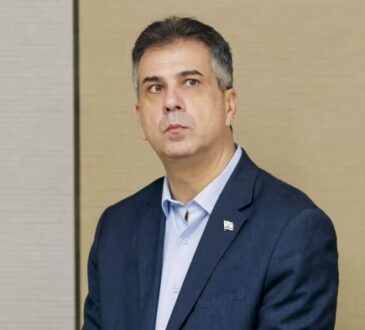
A high-level panel discussion dubbed “Empowering Young Women through Agriculture and Agri-Business: A Force Multiplier for Gender Equality and Women’s Empowerment in South Sudan” was held on Thursday in Juba, bringing together government officials, United Nations representatives, civil society, and private sector leaders to champion women’s central role in South Sudan’s agricultural transformation.
Organized by the United Nations Country Team in South Sudan, in close collaboration with national stakeholders and development partners, the event marked a significant milestone as the nation celebrates its Year of Agriculture, alongside the 25th anniversary of United Nations Security Council Resolution 1325 on Women, Peace, and Security and 30 years since the Beijing Declaration and Platform for Action.
Opening the discussion, Abdelbagi Hussein Akol, Minister of Agriculture and Food Security, highlighted the event’s significance in aligning agricultural growth with gender equality goals.
“This commemoration serves as a powerful reminder that women’s empowerment is not a peripheral issue—it is central to achieving lasting peace, sustainable prosperity, and community resilience. When women thrive, families flourish, communities are strengthened, and the nation prospers,” Akol stated.
He also extended appreciation to the United Nations family under the leadership of Anita Kiki Gbeho, Acting Special Representative of the Secretary-General, for their continued partnership in promoting inclusive development.
For her part, Delphine Serumaga, UN Women Country Representative in South Sudan, emphasized that agriculture remains the backbone of the South Sudanese economy—employing nearly 70 percent of the population and with women constituting almost 80 percent of the agricultural workforce.
“Women drive food production, support rural economies, and sustain communities,” she noted. “Yet, despite their vital role, women continue to face barriers to land ownership, access to finance, technology, and extension services—challenges that limit not only their productivity but also South Sudan’s broader economic growth.”
She underscored the urgency of addressing these gaps, especially as more than seven million people in South Sudan face food insecurity.
Representing the Ministry of Gender, Child, and Social Welfare, Sarah Cleto Hassan Rial, who also serves as the health minister, reaffirmed the government’s commitment to advancing gender equality. She cited South Sudan’s ratification of key instruments, including the Maputo Protocol and CEDAW, as critical steps toward strengthening accountability and gender mainstreaming.
“Currently under consideration is the Gender Equality Bill, which proposes the establishment of a National Gender Authority to institutionalize gender mainstreaming and ensure accountability across all sectors,” Cleto said. “To leave no one behind, we must prioritize the collection and use of gender-disaggregated data. Without accurate data, inequality remains invisible. What remains unseen cannot be transformed.”
Meanwhile, in her closing remarks, DSRSG/RC/HC Anita Kiki Gbeho emphasized that food security is the way forward for South Sudan, calling for actionable ideas on finance, infrastructure, climate, energy, and capacity building.
“Without peace, there will be no change, regardless of the billions invested,” she said. “I hope today we have planted a seed for a better, more prosperous South Sudan, where no one, especially those in agriculture, is left behind.”
On his part, Dr. John Kanisio, Under Secretary, Ministry of Agriculture, commended the panel’s focus on women and youth empowerment, underscoring the ministry’s ongoing efforts to integrate gender equality into national agricultural policy and planning.
“Empowering women in agriculture is not just a gender issue—it’s an economic imperative,” said Dr. Kaniso. “When we invest in women farmers, we invest in the future of South Sudan’s food security and stability. The Ministry is committed to creating an enabling environment where women and young people can access land, credit, and modern technologies to transform agriculture into a driver of inclusive growth.”
Participants reaffirmed their collective commitment to empowering women and youth as drivers of food security, peacebuilding, and sustainable economic growth. The event concluded with a call to action for strengthened partnerships, investment in women-led agribusinesses, and the removal of barriers limiting women’s participation in agricultural decision-making.
The panel featured key speakers, including Meshack Malo, FAO Country Representative in South Sudan, and young women entrepreneurs who shared inspiring stories of innovation and resilience in agribusiness.
The discussion served not only as a celebration of progress but also as a rallying point for continued collaboration toward a more inclusive, resilient, and food-secure South Sudan.



